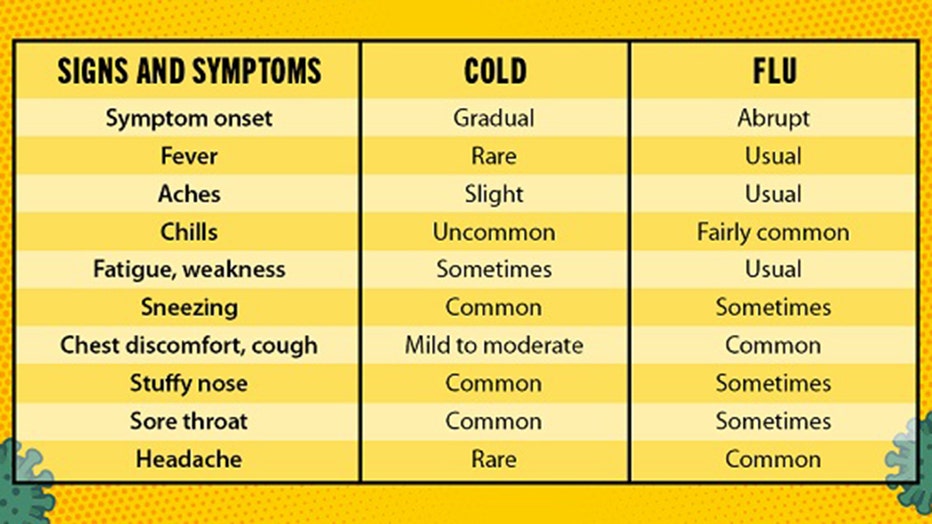Flu vs. common cold vs. COVID-19: Similar symptoms, many questions

Coronavirus: What it is and how it impacts you
Carolina Sanchez breaks down what you need to know about this health affliction.
The flu, the common cold and the new coronavirus are circulating at the same time and patients and doctors are parsing who needs what tests or care. Differences in symptoms can help tell which virus is to blame. Flu comes on suddenly and more severely than a cold, often with a higher fever, aches, chills and a dry cough. Symptoms of the new coronavirus include a cough, shortness of breath and a fever that may not appear right away. Doctors urge patients to call ahead if they're sick and not just show up seeking care. It's not too late to get a flu shot.
Is it the flu, a cold or the new coronavirus? Patients and doctors alike are parsing signs of illness to figure out who needs what tests or care and how worried they should be.
"You have three different major viruses floating around at the same time," causing somewhat similar symptoms — but different levels of concern, said Dr. Gary LeRoy, president of the American Academy of Family Physicians.
COVID-19, the disease caused by the new coronavirus, is a flu-like illness that has killed a small fraction of the number of people that the flu kills every year. Most people infected by the new coronavirus develop mild or moderate symptoms and recover after about two weeks.
SO WHAT DO I HAVE?
Flu, cold and coronavirus often share certain symptoms, but differences in intensity and how they appear can offer clues to which one is causing the misery. Doctors can test for the flu and get results within a day, but coronavirus testing is still limited by availability in the United States.
Colds are often suspected because adults get about two on average each year, said LeRoy, a family medicine doctor and associate dean at Wright State University in Dayton, Ohio.
"The common cold just starts out with a sore or scratchy throat, cough, runny nose, stuffy nose" and any fever is usually mild, he said.
Flu symptoms are more intense and usually come on suddenly, the Yale New Haven Health System advises. They can include a high fever (over 100.5 degrees), extreme exhaustion, muscle or body aches, a dry cough and chills.
"It really hits you like a bus," and people may start a day well but feel terrible by afternoon, LeRoy said.
Flu symptoms can include a runny or stuffy nose, headaches and possibly vomiting or diarrhea, though the latter two are more common in children than adults, the U.S. Centers for Disease Control and Prevention says.

What is a pandemic?
Dr. Purvi Parikh, an immunologist at NYU Langone, said she expects the WHO to declare COVID-19 a pandemic at some point in the coming weeks and pointed out that not every country has reported a case of the virus yet. She said that a pandemic is when that epidemic then gets amplified globally, so it's spreading through multiple countries and around the globe.
Symptoms of COVID-19 may appear more slowly. They usually include fever, a dry cough and noticeable shortness of breath, according to the World Health Organization. A minority of cases develop pneumonia, and the disease is especially worrisome for the elderly and those with other medical problems such as high blood pressure, obesity, diabetes or heart conditions.
One study of hospitalized patients in China found that about half did not have a fever when they were admitted but nearly all developed one.

Is it a cold or the flu? (CDC)
WHAT TO DO IF YOU'RE SICK
Don't go straight to your doctor's office -- that just risks making more people sick, officials urge. Call ahead, and ask if you need to be seen and where.
Fever, cough and noticeable shortness of breath -- "if you have those three components, especially if it's associated with some recent travel or someone you know who's been exposed to COVID-19, those things should prompt you to call for medical attention," LeRoy said.
"Mildly ill patients should be encouraged to stay home," the CDC's Dr. Sue Gerber told doctors on a conference call last week. People having difficulty breathing should seek care, and older people or those with other conditions should contact their doctors early in the course of illness, she said.
---------
Get breaking news alerts in the FOX5NY News app. It is FREE! Download for iOS or Android
---------
PREVENTION
To protect yourself, wash your hands well and often, keep them away from your face, and avoid crowds and standing close to people.
There's one big difference between flu and coronavirus: A vaccine exists to help prevent the flu and it's not too late to get it. It won't protect you from catching the coronavirus, but may put you in a better position to fight it.
"You don't want to have a compromised immune system if you were to encounter coronavirus," LeRoy said.

